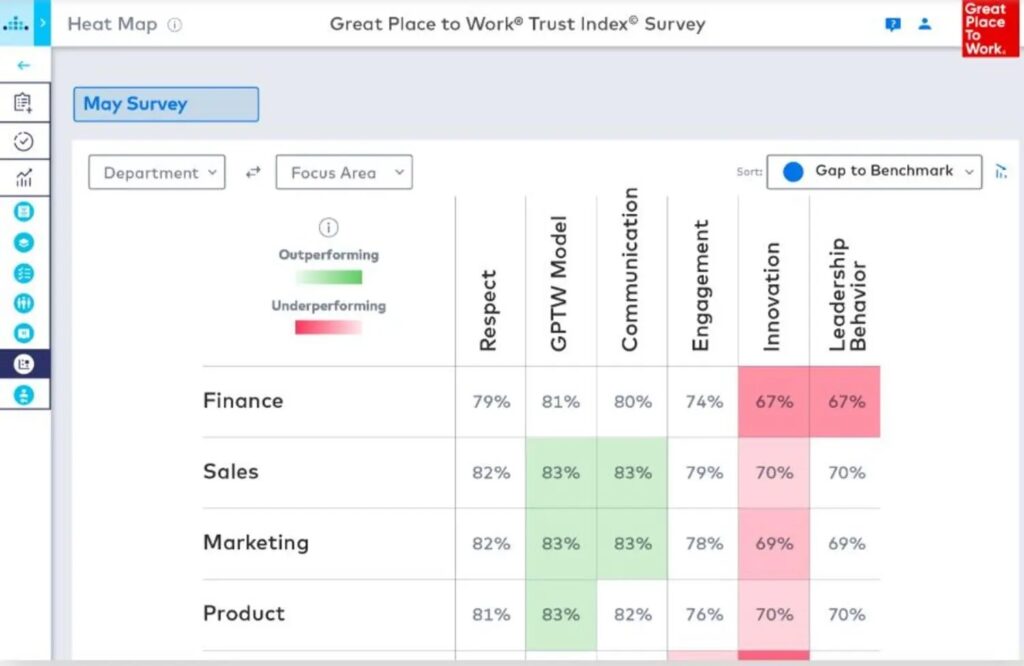
Cyprus businesses are facing a pivotal question: Are employee voices truly shaping success, or is engagement just an afterthought? As organisations across the island compete for talent, they’re discovering that genuine employee engagement isn’t optional—it’s a strategic necessity.
One tool is leading this transformation—the employee engagement survey. More than a simple feedback form, these surveys draw from global workplace best practices to capture candid insights about job satisfaction, workplace culture, career growth, and well-being.
By listening closely and analysing honest, anonymous responses, companies in Cyprus can pinpoint what motivates their teams and discover the hidden barriers that hold them back. This data-driven approach enables leadership to take focused action, crafting targeted strategies for improvement and tracking progress in real time.
Employee engagement surveys empower Cypriot organisations to build cultures of transparency, productivity, and long-term retention—creating workplaces where employees feel heard, valued, and inspired to contribute to shared goals.
What is an employee engagement survey?
An employee engagement survey is a structured tool organisations use to assess how invested, motivated, and committed their employees feel towards their work and company objectives. By gathering feedback on essential workplace factors—such as job satisfaction, company culture, leadership quality, growth opportunities, and overall well-being—these surveys deliver a holistic view of the employee experience.
Unlike conventional questionnaires, employee engagement surveys blend quantitative rating scales with open-ended qualitative questions, allowing for both measurable results and deeper insights into employee perspectives. The primary aim is to uncover what drives engagement, highlight obstacles or pain points, and track changes over time.
Analysing survey results empowers organisations to spot trends, address challenges, and implement focused strategies that elevate satisfaction, retention, and performance. In Cyprus and beyond, regular engagement surveys are vital for creating transparent, trusting workplace cultures where continuous improvement is both expected and achieved.
Are employee engagement surveys confidential?
At Great Place to Work®, we take confidentiality seriously. Our Trust Index™ Survey is conducted using a secure, third-party platform that anonymizes responses from the moment they’re submitted. We ensure that no personally identifiable information is ever connected to individual answers, and results are reported only in aggregated form.
To protect anonymity further, no detailed analysis is provided for any demographic group with fewer than five respondents. This rule is strictly followed to prevent indirect identification of individuals, especially in smaller teams or departments. You can learn more about our confidentiality practices and about how the Trust Index™ Survey works.
By following these best practices, we create a safe environment where employees feel empowered to share their true experiences—leading to more accurate data and more meaningful change.
What is the purpose of an employee engagement survey?
The primary purpose of an employee engagement survey is to capture candid, meaningful feedback from employees about their daily work experience, satisfaction, and aspirations. These surveys empower organisations to understand what drives engagement, pinpoint specific areas for improvement—such as leadership, communication, or development opportunities—and track progress over time.
By giving employees an avenue to express their genuine opinions, engagement surveys foster trust, transparency, and a sense of belonging across the company. The actionable insights generated allow leaders to make informed, data-driven decisions that optimise workplace culture, boost morale, and strengthen employee satisfaction, retention, and performance.
How are engagement levels measured in these surveys in Cyprus?
Employee engagement surveys in Cyprus use multiple methods to accurately gauge how connected and motivated employees feel in their roles. The most common approach is the Likert scale, where staff rate their agreement with statements about their workplace experience—for example, “I feel proud to work for this organization”—by selecting from options like “Strongly Disagree” to “Strongly Agree”.
Many organisations in Cyprus use the Employee Net Promoter Score (eNPS), which directly asks employees how likely they are to recommend their workplace to others. This metric helps reveal overall loyalty and satisfaction, providing a concise benchmark for comparison. Surveys also incorporate qualitative open-ended questions, inviting staff to share detailed thoughts, feelings, and suggestions for improvement.
By closely analysing responses from both quantitative and qualitative methods, companies in Cyprus can uncover engagement trends, identify problem areas, and develop practical strategies for progress. This comprehensive approach ensures a clear and actionable understanding of employee engagement across diverse teams and departments.
What benchmarks are used in employee engagement surveys in Cyprus?
Benchmarking is a crucial component of employee engagement surveys in Cyprus, providing organisations with the context needed to interpret results and track progress over time. At Great Place to Work®, our surveys are delivered through Emprising™, our proprietary, secure SaaS platform.
Organizations that repeat the survey over time benefit from powerful trending analysis tools, which allow them to clearly identify areas of improvement or decline compared to previous years. These visual comparisons help leadership teams spot progress, prioritize actions, and maintain momentum.
Moreover, within the platform’s results section, users can access a clearly marked Best Workplaces™ Benchmark, which shows how their results compare to the highest-performing organizations in the country.
This external benchmark provides valuable context for interpreting scores and setting meaningful goals. With this combination of reliable data, historical insights, and world-class benchmarking, companies in Cyprus can make smarter, evidence-based decisions to build great workplace cultures.
What is an employee engagement survey software?
An employee engagement survey software is a specialised digital platform—typically delivered as Software as a Service (SaaS)—that helps organisations design, distribute, and analyse employee engagement surveys efficiently.
These tools enable companies to gather feedback from employees on various aspects of their work experience, such as satisfaction, motivation, workplace culture, and leadership effectiveness.
In Cyprus, organisations often use platforms like Great Place to Work’s Emprising™ for these purposes, benefiting from secure survey administration, robust analytics, and benchmarking against local and international best workplaces.
Employee engagement survey software streamlines the entire process of collecting, analysing, and acting on employee feedback, empowering organisations to build a more engaged, productive, and satisfied workforce.
What analytics tools does engagement survey software include?
Employee engagement survey software features a comprehensive suite of analytics tools designed to help organisations effectively interpret feedback and drive meaningful action.
The most important analytics features available in survey software platforms include:
- Real-Time Analytics and Dashboards: Instantly visualize survey results, track participation rates, and monitor engagement trends across the organisation.
- Sentiment Analysis: Uses AI and machine learning to analyse open-ended responses, uncovering underlying emotions and themes that may not be obvious from quantitative data alone.
- Predictive Analytics: Identifies patterns in engagement data and forecasts future trends, enabling organisations to proactively address potential challenges.
- Segmentation and Filtering: Breaks down results by department, tenure, team, manager, or other demographics to reveal differences in engagement across groups and pinpoint specific areas for improvement.
- Benchmarking: Compares survey results to internal historical data, industry standards, or external benchmarks such as Best Workplaces™ to provide context and set realistic goals.
- Customizable Reporting: Generates detailed, tailored reports for leadership and managers, highlighting key findings, trends, and actionable insights.
- Action Planning Tools: Links analytics directly to action plans, helping organisations prioritise the following steps and track the impact of engagement initiatives over time.
- Integration with HR Systems: Syncs engagement data with other HR tools for a holistic view of workforce trends and performance.
These analytics tools empower organisations in Cyprus and beyond to move beyond basic survey scores, transforming raw employee feedback into strategic insights that drive continuous improvement in workplace culture and employee engagement.
What are the steps of an employee engagement survey in Cyprus?
Cyprus’s employee engagement survey process is designed to gather and analyze data in a structured and effective way. When a company decides to launch an engagement survey—such as the Great Place to Work® Trust Index™ Survey—the process begins by reviewing the 60 core statements developed by Great Place to Work, which assess key dimensions of a high-trust workplace. Companies can choose to include additional custom questions or demographic filters if they wish to explore specific focus areas.
Next, a two-week survey window is selected during which the survey will be live. All employees are invited to participate, and the survey is typically delivered via a secure link through email to ensure confidentiality and easy access. After the survey window closes, the data is aggregated and analyzed through the Emprising™ platform, helping organizations identify strengths, uncover areas for improvement, and spot meaningful trends.
The final and most critical step is action planning, where leadership teams use the insights gathered to build targeted strategies for improving the workplace. This structured approach ensures that feedback turns into impact—and that employees see real change based on their voices.
1. Engagement Index
The first step of an employee engagement survey in Cyprus involves calculating the Engagement Index. This comprehensive metric distils survey responses into a single, precise score reflecting overall workforce engagement.
This index is built from employee ratings across key engagement factors—such as job satisfaction, manager relationships, alignment with company values, access to development opportunities, and overall well-being. By combining these insights, Cypriot organisations obtain one clear number that is easy to interpret and track.
The Engagement Index enables businesses to benchmark progress, identify strengths and areas for improvement, and monitor changes in engagement over time. A rising Engagement Index is a positive signal, often indicating higher productivity, lower staff turnover, and a more motivated, resilient workplace culture.
2. Employee Net Promoter Score (eNPS)
The second step in the employee engagement survey process in Cyprus is calculating the Employee Net Promoter Score (eNPS)—a widely used metric that assesses how likely employees are to recommend their organisation as a great place to work. Employees answer a single, powerful question: “How likely are you to recommend this company as a workplace?” using a scale from 0 (not at all likely) to 10 (extremely likely).
Responses are then grouped into three categories: Promoters (scores 9–10), Passives (scores 7–8), and Detractors (scores 0–6). The eNPS is calculated by subtracting the percentage of Detractors from the percentage of Promoters, giving a score that ranges from -100 to +100. A higher eNPS indicates greater employee satisfaction and loyalty, while a lower score highlights areas that may require focused attention or improvement.
ENPS offers a simple yet impactful way for Cypriot organisations to gauge overall sentiment, identify advocates within the workforce, and highlight potential risks to employee engagement and retention.
3. Turnover Rates
The third step in the employee engagement survey process in Cyprus examines Turnover Rates, a key metric for understanding how frequently employees are leaving the organisation. By monitoring turnover alongside engagement data, companies can quickly identify departments or teams experiencing high exit rates—often a sign of underlying disengagement or workplace challenges.
High turnover can lead to increased costs and loss of valuable expertise, making it essential to act on trends revealed by the survey. Analysing engagement scores in parallel with turnover data empowers organisations to pinpoint specific problem areas and implement targeted strategies to improve retention, reduce costs, and sustain a stable, knowledgeable workforce.
4. Comparison to Industry Averages
The fourth step in Cyprus’s employee engagement survey process is to compare survey results against industry benchmarks, providing valuable context for interpretation. By benchmarking engagement scores with top-performing organisations in the same field, companies can accurately evaluate their position—seeing whether their results are average, below, or above the standard.
Industry benchmarks help pinpoint strengths and highlight areas for strategic improvement, giving leadership a clear perspective on competitive standing. When making these comparisons, it’s vital to account for factors like company size, unique industry challenges, and the broader economic climate, as these elements directly influence engagement levels. This approach empowers organisations to identify opportunities, strengthen their competitive edge, and create a workplace that is more attractive and engaging for employees.
5. Year-on-Year Trends
The fifth step in the employee engagement survey process in Cyprus is to analyse year-on-year trends, which reveal how workforce sentiment evolves over time. By tracking changes in engagement scores annually, organisations can evaluate the impact of initiatives—such as new leadership programmes or flexible work policies—and quickly identify emerging patterns in employee experience and morale.
Annual trend analysis offers invaluable insights, allowing decision-makers to determine which strategies are truly effective and which may need adjustment or replacement. This proactive, data-driven approach enables Cypriot companies to continuously refine their engagement efforts, sustain progress, and adapt to changing workforce needs for long-term success.
6. Segmentation Data
The sixth step in Cyprus’s employee engagement survey process is analysing segmentation data, which breaks down survey results by demographic groups, departments, teams, or other relevant categories. This breakdown helps identify potential engagement level disparities and tailor interventions to address specific needs.
| Segment | Engagement Score | Key Findings |
| Marketing Department | 85% | High levels of satisfaction with work-life balance and opportunities for creativity. |
| Sales Team | 70% | Concerns about workload and clarity of career progression. |
| Remote Employees | 80% | Feeling well-supported by technology and communication channels. |
For instance, if the segmentation data reveals that remote employees report lower engagement levels than in-office employees, organizations can investigate the reasons behind this disparity and develop targeted initiatives to enhance their experience.
What types of employee engagement survey questions are used in Cyprus?
Employee engagement surveys in Cyprus use a diverse mix of question types to gain a comprehensive understanding of how employees feel about their work environment, teams, and company culture. These questions gather insights on job satisfaction, relationships with managers, opportunities for growth, and overall well-being—core areas that shape the employee experience.
The main types of survey questions include:
- Likert scale questions: Respondents indicate their level of agreement with statements, such as “I feel my work is valued at this company,” using a scale from “Strongly Disagree” to “Strongly Agree.” This approach provides clear, quantitative data on key engagement drivers.
- Rating scale questions: Employees rate experiences or likelihood on numeric scales, e.g., “On a scale of 1 to 10, how likely are you to recommend our company as a great place to work?”.
- Multiple-choice questions: These offer predefined options to quickly gauge preferences on topics like communication channels or training.
- Binary questions: Simple “yes/no” questions like, “Do you feel your ideas are heard at work?” reveal gaps in support or resource allocation.
- Open-ended questions: Employees share detailed thoughts or suggestions, providing in-depth qualitative insights, e.g., “What would you change about your role or work environment?”.
- Demographic questions: Collect information on department, tenure, or location to facilitate segmentation analysis.
- Ranking questions: Ask employees to rank factors such as compensation, career growth, or company values by importance and how well they are demonstrated.
This blend of question types ensures Cypriot companies can measure both the breadth and depth of employee engagement, detect trends over time, and uncover specific areas needing targeted action.
Can employee engagement surveys influence retention rates?
Yes, employee engagement surveys can significantly influence retention rates when organisations act on the feedback they receive. These surveys give employees an opportunity to voice concerns and suggest improvements, which helps build a trusting and supportive culture. Companies that use engagement survey insights to implement targeted changes often report lower turnover and higher employee loyalty.
Research shows that organisations seeking regular employee feedback have turnover rates that are up to 15% lower than those that don’t, and engaged employees are nearly 87% less likely to leave their company. Simply running surveys isn’t enough—actual improvements based on employee feedback are key for boosting morale and retention in the long term.
Why should businesses in Cyprus use employee engagement surveys?
Businesses in Cyprus should use employee engagement surveys because these tools are essential for building a motivated, productive, and resilient workforce—key drivers of business success in today’s competitive market.
Here’s why:
- Attract and Retain Talent: Employee engagement is crucial for attracting skilled workers and retaining them in the long term, thereby reducing costly turnover and ensuring a stable, experienced team.
- Boost Productivity and Innovation: Engaged employees are more committed, creative, and willing to go the extra mile, directly impacting company performance and profitability.
- Gain Honest, Actionable Feedback: Surveys provide a safe and structured way for employees to share their true thoughts and experiences, allowing leadership to identify strengths and pinpoint areas for improvement—such as communication gaps, a lack of recognition, or limited growth opportunities.
- Support Data-Driven Decisions: The insights from engagement surveys are grounded in real data, enabling leaders to prioritize actions, allocate resources effectively, and measure the impact of new initiatives.
- Foster Trust and Open Communication: Regularly seeking employee feedback shows staff that their opinions matter, helping to build a culture of transparency, trust, and inclusion.
- Track Progress and Continuous Improvement: By conducting surveys over time, companies can monitor engagement trends, evaluate the effectiveness of changes, and continuously refine their people strategies.
- Strengthen Company Culture: Surveys help organizations understand what drives engagement and satisfaction, enabling them to cultivate a positive, supportive, and high-performing workplace.
In summary, employee engagement surveys enable Cypriot businesses to listen to their workforce, make informed decisions, and foster a thriving environment where employees feel valued and motivated to contribute to the organisation’s goals and long-term growth.
Turn Your Workplace into a Great Place to Work!
Employees thrive in great company cultures—let’s build yours! Whether you’re aiming for higher engagement, better retention, or Great Place to Work certification, we’re here to help. Fill out the form and let’s talk!
Latest Articles

The Importance of Cultural Diversity for Cypriot Businesses

What Is a DEI Survey and Why It Matters for Cypriot Workplaces

Managing Diversity in the Workplace: What Cypriot Companies Should Know

17 Different Types of Workplace Diversity in Cyprus

8 Warning Signs of Toxic Workplace Culture in Cyprus (and How to Fix Them)

